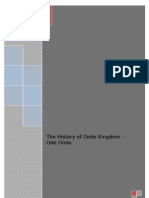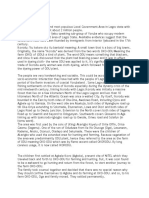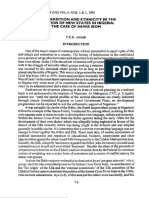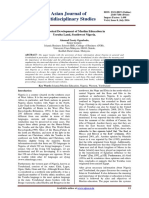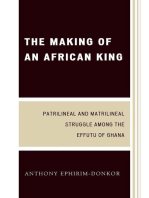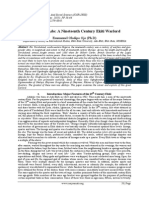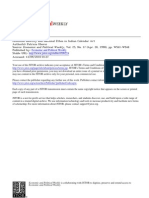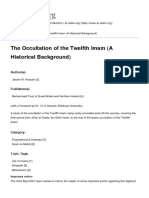ITSEKIRI
ITSEKIRI
Uploaded by
Edema Favour ToritseCopyright:
Available Formats
ITSEKIRI
ITSEKIRI
Uploaded by
Edema Favour ToritseOriginal Description:
Copyright
Available Formats
Share this document
Did you find this document useful?
Is this content inappropriate?
Copyright:
Available Formats
ITSEKIRI
ITSEKIRI
Uploaded by
Edema Favour ToritseCopyright:
Available Formats
Home
History
Executives
Photo Gallery
News
Events
Obituary
Communique
November 26, 2010
Who Are The Itsekiri?
The Itsekiri are a peculiar and unique people in the Nigerian Niger delta. They have inhabited their homeland, which now constitutes the three Warri Local Government Areas of Delta State, Nigeria, for centuries. The Itsekiri have rich traditional and cultural practices. Itsekiri modern history dates from the late fifteenth century when the Itsekiri people adopted a prince from Benin Kingdom as their monarch. Prior to this time, Itsekiri lived independently in different communities that included Irigbo, Ureju, Omadino and Ugborodo. With the arrival of the prince and adoption of the monarchy, these communities coalesced to become a Kingdom. The current monarch is Ogiame Atuwatse II, who was crowned at an impressive ceremony in 1987. History reveals that in several waves of migration before the 15th Century, and some a little later, groups from Igala in Nupe country came in through the creeks; Yoruba from ljebu-Ode, Akure and Owo found their way into parts of the Kingdom and a group from Aboh also came in. Some along the coast came in through Gulani/Amatu.
Itsekiri Culture - Click here
Nigerian Government Delta State National Assembly Nigeria The Presidency
Ogiame Atuwatse II Olu of Warri
LIST OF PAST OLUS
Media Warri Mirror The Guardian
Punch Daily Champion This Day Vanguard Daily Independent Nigerian Tribune
Historically, the ltsekiri have a monarchy, over 500 years old, and which, as a rallying point in their society, remains its supreme government. From 1480 to now, there have reigned 19 Olu of Warri: five Olus of the pre-Christian era; 1480 1597: eight Roman Catholic Olus from 15971735, and six Olus of the post-Roman Catholic Christian era. Atuwatse I, baptized as Dom Domingo reigned between 1625 and 1643, having studied in Coimbra University in Portugal for eleven years where he obtained a degree. Click to read more!
Olu Ginuwa I
1480 AD established Kingdom Succeeded his father Succeeded his brother Succeeded his father Succeeded his father in 1597 1597 - 1625 1625 - 1643
2 3 4 5
Olu Ogbowuru I Olu Irame I Olu Ojoluwa I Olu Esigie I
Ethnic sites Asaba Edo Ibuzor Igbo Ijaw Urhobo Yoruba 6 Olu Atorongboye I Olu Atuwatse I
Our Culture
7 8 9
Olu Oyenakpagha I 1643 - 1654 Olu Omoluyiri I 1654 1674 1674 - 1700 From 1700 AD Succeeded his father Succeeded his father 1735 - 1760 1760 - 1795 1795 - 1848
10 Olu Abejioye I 11 Olu Akenjioye I Related Links kikiri Warri Front Line UK Itsekiri Survival Movement 12 Olu Omagboye I 13 Olu Akengboye I 14 Olu Atogbuwa I 15 Olu Erejuwa I The itsekiri people have always been known as a very cultured group of people. Oral and written history shows that in the early days the Itsekiri had very impressive trade, cultural links and relationships, with people of different ethnic, racial and religious backgrounds. These relationships greatly influenced and helped to broaden and enrich their cultural life. Click to learn about our foods, clothing, music, and common names, including religion. Your ad here! 16 Olu Akengbuwa
Sponsors
(Click for our rates)
1848 - 1851 (a period of crisis) 1851 - 1936 (political Interregnum) 7 February 1936 (Restoration of Oluship) 17 Olu Ginuwa II 18 Olu Erejuwa II 1936 - 1949 1951 - 1986
Your ad here!
You are welcome to contact us at:
info@itsekiri.org or at P.O. Box 11465, Washington, DC 20008 We look forward to your comments, concerns or questions. Home | History | Executives | Photo Gallery | News | Events | Obituary | Communique
Copyright 2005-2008 | Ugbajo Itsekiri USA, INC. Site design HiQuE Imaging
Admin
skip to main | skip to sidebar
N I GE R I A N P EO P LE S AND CU LT UR E S
NIGERIA HAS DIVERSE FASCINATING CULTURES EACH WITH ITS OWN TRADITIONS AND, BELIEFS PLUS MANY TOURISM STRONG POINTS. CONTRARY TO POPULARLY BELIEFS IN INTERNATIONAL CIRCLES NIGERIANS ARE A FRIENDLY AND HARD WORKING PEOPLE WHO HAVE BEEN POORLY SPOKEN FOR IN INTERNATIONAL COMMUNITIES. POSTS FROM THIS PAGE WILL HELP INTERESTED READERS TO GET TO NIGERIANS AND OUR DIVERSE RICH CULTURES BETTER. PROUDLY NIGERIAN. EXCEPTION
SATURDAY, AUGUST 2, 2008
ITSEKIRI NAITON
Above;Traditional attires of the Itsekiri people Below;Cultural dances of the Itsekiri people
The Itsekiri are a peculiar and unique people in the Nigerian Niger delta. They have inhabited their homeland, which now constitutes the three Warri Local Government Areas of Delta State, Nigeria, for centuries. The Itsekiri have rich traditional and cultural practices. Itsekiri modern history dates from the late fifteenth century when the Itsekiri people adopted a prince from Benin Kingdom as their monarch. Prior to this time, Itsekiri lived independently in different communities that included Irigbo, Ureju, Omadino and Ugborodo. With the arrival of the prince and adoption of the monarchy. These communities coalesced to become a Kingdom. The current monarch is Ogiame Atuwatse II, who was crowned at an impressive ceremony in 1987. History reveals that in several waves of migration before the 15th Century, and some a little later, groups from Igala in Nupe country came in through the creeks; Yoruba from ljebu-Ode, Akure and Owo found their way into parts of the Kingdom and a group from Aboh also came in. Some along the coast came in through Gulani/Amatu. Historically, the ltsekiri have a monarchy, over 500 years old, and which, as a rallying point in their society, remains its supreme government. From 1480 to now, there have reigned 19 Olu of Warri: five Olus of the pre-Christian era; 1480 - 1597: eight Roman Catholic Olus from 1597-1735, and six Olus of the post-Roman Catholic Christian era. Atuwatse I, baptized as
Dom Domingo reigned between 1625 and 1643, having studied in Coimbra University in Portugal for eleven years where he obtained a degree. The first-ever church monastery built in what today is Nigeria was erected in Big Warri (Ode-ltsekiri) before 1700 and was christened Saint Anthony (today, the site is known as Satone). As an ethnic nationality, the Itsekiri people are a micro-minority in Delta State. Estimated at over 450,000, Itsekiri is one of the five distinct ethnic nationalities in Delta State, Nigeria. The Itsekiri ancient Kingdom of Warri dates back to the 15th century. Their 1,520 square mile homeland, known over time in history as Iwere or Awyri, Warree, Aweri and Wari etc, had diplomatic, Christian and trade relations with Medieval Europe between the 16th and 18th centuries. It became a prominent trade centre within the Oil Rivers Protectorate. Obaro Ikime, a prominent historian described the Itsekiri homeland as follows: "The Itsekiri inhabit the North Western extremity of the Niger Delta in area bounded approximately by latitudes 50 20 and 60 N and longitudes 50 5 and 50 40 East. Their neighbors are Bini to the North, the Ijaw to the South, the Urhobo to the East and the Yoruba of Ondo province to the North - West." ( Obaro Ikime Phd Merchant Prince of the Niger Delta, 1968). The following also appeared in the footnote of Professor Allan Ryder's, book, Benin and Europeans 1485-1897 {page 108. "A.S.C. Scritture originali vol. 249 F328} - many varieties of the spelling of Iwere (Itsekiri word) appear in European documents. In the twentieth century English version - Warri has become the most common and will be used in future for the Kingdom of Itsekiri" A highly cultured people, over the centuries they had impressive trade and cultural links with different people and these ties helped to broaden and enrich their cultural life. The Itsekiri were among the first to have contact with the Portuguese traders in the 16th Century. Traditionally, the ltsekiri are fishermen and traders. The promotion of economic activity was a major pre-occupation of the ltsekiri monarch from the 16th Century. The fact that there existed a kingdom was important in the decision of the Europeans to do business with the ltsekiri. (Europeans tended to go to areas, which had a political system that could guarantee peaceful trade). The early contacts of the Itsekiri with
medieval Europe, especially Portugal, helped to foster a conservative Christian education and civilization in Itsekiriland and the people remain proud of this historical circumstance. The coastal location of the kingdom and accessible waterways and rivers did not only lead to the early contacts of the Itsekiri with medieval Europe, especially Portugal and foster a conservative Christian education and civilization, but it led to its significant prosperity between the sixteenth and nineteenth centuries as trade with neighboring ethnic groups and Europeans flourished. These interactions also led to an Itsekiri prince, christened Domingo, going to study in Portugal for eleven years in the seventeenth century and returning as the first Itsekiri to graduate from college. Itsekiri prosperity proved to be a fertile environment for the emergence of prominent Itsekiri leaders like several kings or Olu. They include, Diare, Olomu and Nanna. The latter three all serving as Governors of Benin River. However, unlike in the past when prosperity from their homeland propelled the Itsekiri people to glorious heights, recent riches have paradoxically become bane to them. Not only has exploitation of crude oil in the area debilitated the ecosystem and destroyed local trades and economies, from 1997 to 2003, Itsekiri were victimized by some of its violent neighbors. Language: Another aspect of the culture, which was greatly influenced by their interaction with other people, is the Itsekiri language. ltsekiri words like oro (gold), sangi (blood), garafa (mug), kidibe (pipe) etc are derived from the Portuguese language. The relationship with the British also helped influence the vocabulary of these very sophisticated group of people. Itsekiri words like torosi, tapita, woske and several others all came from English language. Their relationship with the Yoruba people and the Benin people also influenced a lot of the Itsekiri vocabulary. Until comparatively recently Itsekiri as a language was the lingua franca that was used by all Urhobo, Itsekiri and Ijaw - in the Warri area. In fact up to the 1940's, anybody in Warri area, stranger or not, learned to speak Itsekiri, dressed the Itsekiri way and were given Itsekiri names.
Courtsey: Ugbajo Itsekiri Community. USA
POSTED BY EXCEPTION AT 1:58 AM
0 COMMENTS:
Post a Comment
Newer Post Older Post Home
Subscribe to: Post Comments (Atom)
FREE SUSCRIPTION
Posts Atom Posts Comments Atom Comments
SUBSCRIBE NOW: POWEREDBY
SUBSCRIBE NOW: TEXT
Subscribe to NIGERIAN PEOPLE
Loading...
BLOG ARCHIVE
2008 (9) September (1) A SMART MOVE TO ENHANCE NIGERIAN UNITY
August (8) var gaJsHost = (("https:" == document.location.pro... National Parks in Nigeria (Nature Unspoilt) THE OSUN SACRED GROOVE. A UNESCO APPROVED WORLD HE... In Nigeria you get so many beautiful scenery that ... ITSEKIRI NAITON IGBO COMMUNITY PART 1 The Great Benin Kingdom (Historical Analogy Of The... This is the Mascot for the festival of art and cul...
ABOUT ME EXCEPTION BENIN CITY, EDO STATE, NIGERIA
If you lack cultural essence then your identity has no substance. Exception
VIEW MY COMPLETE PROFILE
You might also like
- Restall, Seven Myths of The Spanish ConquestDocument119 pagesRestall, Seven Myths of The Spanish ConquestGooch MikeyNo ratings yet
- Tips - The Warrant Chiefs Indirect Rule in Southeastern N PDFDocument350 pagesTips - The Warrant Chiefs Indirect Rule in Southeastern N PDFISAAC CHUKSNo ratings yet
- CHAPTER ONE & TWO For DANIELONIYIDE-1Document28 pagesCHAPTER ONE & TWO For DANIELONIYIDE-1Rahman Oluwaseyi100% (1)
- Ibibio LanguageDocument3 pagesIbibio LanguageTony AkpanNo ratings yet
- Amanke Okafor - The Oka PeopleDocument171 pagesAmanke Okafor - The Oka PeopleOmenigbo100% (1)
- History of UyoDocument3 pagesHistory of UyoUnyime NathanielNo ratings yet
- History of Ondo KingdomDocument18 pagesHistory of Ondo KingdomBenraph Nezer Ebenezer AkinsulireNo ratings yet
- Benin EmpireDocument24 pagesBenin EmpireEdwin AigbeNo ratings yet
- Souvenir Programme of The 5th Anniversary of Henshaw VI (Obong of Calabar)Document22 pagesSouvenir Programme of The 5th Anniversary of Henshaw VI (Obong of Calabar)Philip Nosa-Adam0% (1)
- Who Are The ShangaDocument29 pagesWho Are The ShangaSamuel Ekpo100% (1)
- Oyo, Benin and Dahomey Plus AshantiDocument8 pagesOyo, Benin and Dahomey Plus AshantiIsrael100% (1)
- Oyo ContemporaneoDocument81 pagesOyo ContemporaneoFilipe OlivieriNo ratings yet
- Evolution 8 TRM PDFDocument132 pagesEvolution 8 TRM PDFK P Bharti100% (7)
- Titanic Resources PDFDocument10 pagesTitanic Resources PDFWrite100% (1)
- Peradotto 1990, Man in The MiddleDocument213 pagesPeradotto 1990, Man in The MiddletvellieNo ratings yet
- The Cambridge History of Science-Porter Roy-Volume 4 The Eighteenth Century 2003 PDFDocument913 pagesThe Cambridge History of Science-Porter Roy-Volume 4 The Eighteenth Century 2003 PDFLaura Forti100% (5)
- The Saga of the Early Warri Princes: A History of the Beginnings of a West African Dynasty, 1480–1654From EverandThe Saga of the Early Warri Princes: A History of the Beginnings of a West African Dynasty, 1480–1654Rating: 5 out of 5 stars5/5 (1)
- Niger-Delta City StatesDocument3 pagesNiger-Delta City StatesVictoria PopoolaNo ratings yet
- Implications For The Future GenerationDocument11 pagesImplications For The Future GenerationTony AkpanNo ratings yet
- Ilaje and ArogboDocument9 pagesIlaje and Arogbosamuel100% (1)
- Ikorodu HistoryDocument4 pagesIkorodu HistoryBashorun MosesNo ratings yet
- IbibioDocument14 pagesIbibioTony AkpanNo ratings yet
- Igbo Traditional Security System: A Panacea To Nigeria Security QuagmireDocument17 pagesIgbo Traditional Security System: A Panacea To Nigeria Security QuagmireChukwukadibia E. Nwafor100% (1)
- History of OguruguDocument6 pagesHistory of OguruguIsani BrightNo ratings yet
- Lagos Island HistoryDocument10 pagesLagos Island HistoryFarafina Kachifo100% (1)
- Efik ObutongDocument7 pagesEfik ObutongMerry CorvinNo ratings yet
- To The Palaver Islands - War and Diplomacy On The Lagos Lagoon in 1852-1854 PDFDocument24 pagesTo The Palaver Islands - War and Diplomacy On The Lagos Lagoon in 1852-1854 PDFSaidNo ratings yet
- Origin or Genealogy of The Igbo People of NigeriaDocument7 pagesOrigin or Genealogy of The Igbo People of NigeriaPatience Philip100% (1)
- Anthony Oham - 2006 - Labor Migration From Southeastern Nigeria To Spanish Fernando PoDocument98 pagesAnthony Oham - 2006 - Labor Migration From Southeastern Nigeria To Spanish Fernando PoEnriqueNo ratings yet
- The Making of an African King: Patrilineal and Matrilineal Struggle among the Awutu (Effutu) of GhanaFrom EverandThe Making of an African King: Patrilineal and Matrilineal Struggle among the Awutu (Effutu) of GhanaRating: 5 out of 5 stars5/5 (1)
- Oil Rivers ProtectorateDocument4 pagesOil Rivers ProtectorateTamunotonye Emmanuel100% (1)
- Yoruba History OlusanyaDocument6 pagesYoruba History OlusanyaEdward EceincoNo ratings yet
- The Osu Cast System in Igboland Discrimination Based On DescentDocument24 pagesThe Osu Cast System in Igboland Discrimination Based On DescentOsu Phenomenon Files100% (1)
- OGWASHI-UKWU - THE UNTOLD STORY OF 'OBALA MONYE ACHA''. by Chris OkaforDocument2 pagesOGWASHI-UKWU - THE UNTOLD STORY OF 'OBALA MONYE ACHA''. by Chris OkaforChris OkaforNo ratings yet
- Buckley - God of SmallpoxDocument15 pagesBuckley - God of SmallpoxGiovanna CapponiNo ratings yet
- Sexuality and Prostitution Among The Akan of The Gold Coast 1650-1950 A.D. (1997)Document31 pagesSexuality and Prostitution Among The Akan of The Gold Coast 1650-1950 A.D. (1997)AbuAbdur-RazzaqAl-Misri100% (1)
- ARO, Olaide. Ismail - The.Ogboni - Of.egbaland - And.constitutional - Controversy.2014 PDFDocument6 pagesARO, Olaide. Ismail - The.Ogboni - Of.egbaland - And.constitutional - Controversy.2014 PDFRenato AraujoNo ratings yet
- Igboism PaperDocument17 pagesIgboism PaperChukwukadibia E. NwaforNo ratings yet
- Periodization of Igbo Written Literature: Problems and ProspectsDocument11 pagesPeriodization of Igbo Written Literature: Problems and ProspectsDavid IsuNo ratings yet
- Benin Prehistory The Origin and SettlingDocument21 pagesBenin Prehistory The Origin and SettlingRafael da RochaNo ratings yet
- CamerunDocument25 pagesCamerunMarco ReyesNo ratings yet
- BeninDynastyOrigin PDFDocument16 pagesBeninDynastyOrigin PDFOsaze OsaroboNo ratings yet
- (B) Political InstitutionsDocument8 pages(B) Political InstitutionsOlatunji MosesNo ratings yet
- Historical Development of Muslim Education in Yoruba Land, Southwest Nigeria.Document9 pagesHistorical Development of Muslim Education in Yoruba Land, Southwest Nigeria.Tunde OgunbadoNo ratings yet
- IGBOUKWUDocument4 pagesIGBOUKWUCaticornzzz CuteNo ratings yet
- The Making of an African King: Patrilineal and Matrilineal Struggle Among the Effutu of GhanaFrom EverandThe Making of an African King: Patrilineal and Matrilineal Struggle Among the Effutu of GhanaNo ratings yet
- The Yoruba of South Western AfricaDocument13 pagesThe Yoruba of South Western Africapeter tichi100% (1)
- Interwar Years Hope or DespairDocument3 pagesInterwar Years Hope or Despairapi-302040090100% (1)
- Oyewumi (1998) Making History, Creating Gender: Some Methodological and Interpretive Questions in Thewriting of Oyo Oral TraditionsDocument44 pagesOyewumi (1998) Making History, Creating Gender: Some Methodological and Interpretive Questions in Thewriting of Oyo Oral TraditionsSolSomozaNo ratings yet
- Asafo BannersDocument60 pagesAsafo BannersAmma BiragoNo ratings yet
- The Tone System of Ibibio: Eno-Abasi Urua University of Uyo, Nigeria/Universität Bielefeld, GermanyDocument17 pagesThe Tone System of Ibibio: Eno-Abasi Urua University of Uyo, Nigeria/Universität Bielefeld, GermanyAniekanNo ratings yet
- MbannoDocument17 pagesMbannosamuelNo ratings yet
- The History of King Jaja of Opobo - NaijaBiographyDocument3 pagesThe History of King Jaja of Opobo - NaijaBiographyBamstep OmotayoNo ratings yet
- Souvenir Programme of The Coronation of Obong Archibong V (April 1954) (Nigerian Field 19)Document12 pagesSouvenir Programme of The Coronation of Obong Archibong V (April 1954) (Nigerian Field 19)Philip Nosa-AdamNo ratings yet
- Igbowukwu ArtDocument6 pagesIgbowukwu ArtOwolabi PetersNo ratings yet
- Aduloju of Ado A Nineteenth Century Ekiti WarlordDocument9 pagesAduloju of Ado A Nineteenth Century Ekiti WarlordJulio Cesar100% (1)
- Internal Migration NigeriaDocument102 pagesInternal Migration NigeriaMohamed BedrouniNo ratings yet
- From Traditional Residential Architecture To The Vernacular The Nigerian ExperienceDocument23 pagesFrom Traditional Residential Architecture To The Vernacular The Nigerian ExperienceTengku RezaNo ratings yet
- Self DeterminationDocument13 pagesSelf DeterminationTWWNo ratings yet
- HistoryDocument9 pagesHistoryGina Precious Vazquez JNo ratings yet
- Introducing Etubom Boco Eneyo Cobham - The Obong-Elect of Calabar and Paramount Ruler-Elect of The EfiksDocument12 pagesIntroducing Etubom Boco Eneyo Cobham - The Obong-Elect of Calabar and Paramount Ruler-Elect of The EfiksPhilip Nosa-Adam100% (1)
- Martin Staniland The Lions of DagbonDocument254 pagesMartin Staniland The Lions of DagbonBabamu Kalmoni Jaato100% (2)
- Althoff G. - Otto IIIDocument228 pagesAlthoff G. - Otto IIIdutch1oneNo ratings yet
- Cefage-Ue Journal Ranking: 3 EditionDocument33 pagesCefage-Ue Journal Ranking: 3 EditionSayla Sowat SiddiquiNo ratings yet
- The History of Rasselas: Prince of Abissinia Summary and AnalysisDocument5 pagesThe History of Rasselas: Prince of Abissinia Summary and AnalysisAlessiaNo ratings yet
- Riph 1Document12 pagesRiph 1Shem Aldrich BalladaresNo ratings yet
- San Rossore Pisa - Kyprouli 2012Document110 pagesSan Rossore Pisa - Kyprouli 2012lollissimo13No ratings yet
- Construction and Diagnosis of GenderDocument155 pagesConstruction and Diagnosis of GenderthangdaotaoNo ratings yet
- Syllabus SSE 2019 PDFDocument14 pagesSyllabus SSE 2019 PDFgunjanNo ratings yet
- (Routledge Studies in South Asian History) Sekhar Bandyopadhyay - Decolonization in South Asia - Meanings of Freedom in Post-Independence West Bengal, 1947-52-Routledge (2009)Document257 pages(Routledge Studies in South Asian History) Sekhar Bandyopadhyay - Decolonization in South Asia - Meanings of Freedom in Post-Independence West Bengal, 1947-52-Routledge (2009)Yudhajit RoychowdhuryNo ratings yet
- Film As Film Formal Experiment in Film 1910-1975Document153 pagesFilm As Film Formal Experiment in Film 1910-1975Katarzyna Słoboda100% (2)
- Uberoi, P. Feminine Identities and National Ethos in Indian Calender ArtDocument9 pagesUberoi, P. Feminine Identities and National Ethos in Indian Calender ArtAnirban Sen50% (2)
- Life Cycle of A Mineral DepositDocument40 pagesLife Cycle of A Mineral Depositktalwar100% (2)
- Pre Colonial Times 21st CenturyDocument32 pagesPre Colonial Times 21st Centuryalyzzaa aaaNo ratings yet
- Personal Record Database (PRDB 1.0) : Permanent Contract Probation DeputationDocument5 pagesPersonal Record Database (PRDB 1.0) : Permanent Contract Probation DeputationJamajsusujNo ratings yet
- Towards An Optimal Instrument: Domenico Scarlatti and The New Wave of Iberian Harpsichord MakingDocument30 pagesTowards An Optimal Instrument: Domenico Scarlatti and The New Wave of Iberian Harpsichord MakingGeovanna OchoaNo ratings yet
- CMH - Pub - 10-4 Corps of Engineers - TroopsDocument641 pagesCMH - Pub - 10-4 Corps of Engineers - TroopsGavin Hardie100% (1)
- Watson - A Witch's Natural History PDFDocument82 pagesWatson - A Witch's Natural History PDFxtabcc100% (1)
- Elaine of Astolat History of A Legend by Alicia MathenyDocument3 pagesElaine of Astolat History of A Legend by Alicia Mathenyapi-340817274No ratings yet
- Lesson 1 - Various Dimensions of Philippine Literary HistoryDocument10 pagesLesson 1 - Various Dimensions of Philippine Literary Historysarah100% (3)
- Lexicology I - HistoryDocument20 pagesLexicology I - HistoryCiatloș Diana ElenaNo ratings yet
- (1920) Historical Sketches of The Ancient NegroDocument108 pages(1920) Historical Sketches of The Ancient NegroHerbert Hillary Booker 2nd50% (2)
- Kashmir StruggleDocument48 pagesKashmir StruggledesikanttNo ratings yet
- 1993 LongDocument25 pages1993 LongPham QuyNo ratings yet
- Feudalism RulesDocument9 pagesFeudalism RulesJohnny MniemonicNo ratings yet
- Berthold Lauffer - The Prehistory of AviationDocument134 pagesBerthold Lauffer - The Prehistory of AviationFlorian Schumacher100% (4)
- The Occultation of The Twelfth Imam (A Historical Background) - 2Document172 pagesThe Occultation of The Twelfth Imam (A Historical Background) - 2Mustafa MirNo ratings yet






